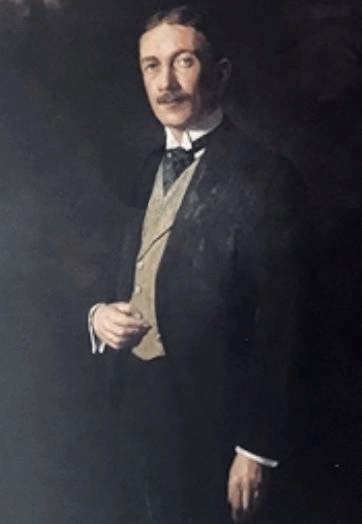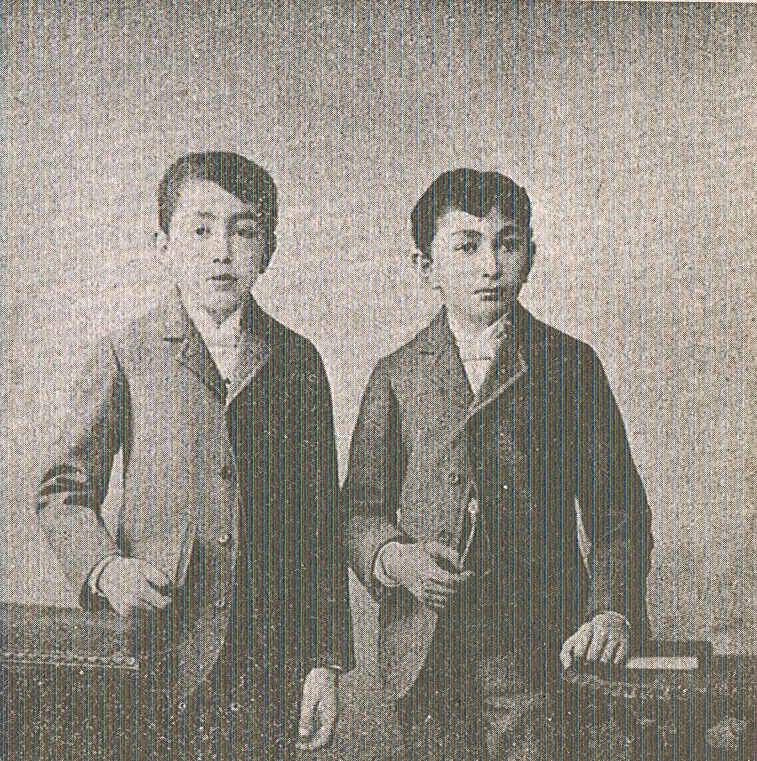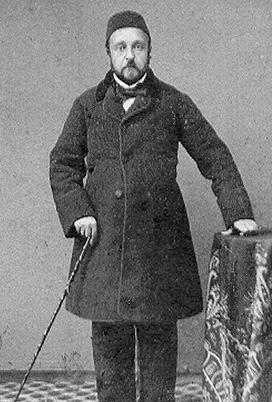|
Ottoman Liberty Party
The Ottoman Liberty Party ( ota, OsmanlÄḟ Ahrar FÄḟrkasÄḟ) was a short-lived liberal political party in the Ottoman Empire during the Second Constitutional Era. It was founded by Prince Sabahaddin, Ahmet Samim, Suat Soyer, Ahmet ReÅit Rey, Mehmet Tevfik Bey and Nureddin Ferruh Bey. Founding Prince Sabahaddin's temporarily united with the Committee of Union and Progress (CUP) after the Young Turk Revolution, however disagreements with the CUP's military cadre and the issue of decentralization lead to the Ottoman Liberty Party being founded on September 14, 1908. Its founders represented the liberal wing of the Young Turks. Sabahattin did not accept the proposed party chairmanship, but supported the party. No official president was elected to the party. The founders of the party were Nureddin Ferruh, Ahmet FazlÄḟ, KÄḟbrÄḟslÄḟ Tevfik, NazÄḟm, Åevket, Celalettin Arif, , , , Ahmet Samim, Damat Salih Pasha, FazÄḟl, and Mabeyinci ReÅit. The party program was prepared by Nur ... [...More Info...] [...Related Items...] OR: [Wikipedia] [Google] [Baidu] |
Sultanzade Sabahaddin
Prince Sabahaddin de NeuchÃḃtel (born Sultanzade Mehmed SabÃḃhaddin Bey; 13 February 1879 â 30 June 1948) was an Ottoman sociologist and thinker. Because of his threat to the ruling House of Osman (the Ottoman dynasty), of which he was a member, in the late 19th and early 20th centuries due to his political activity and push for democracy in the Empire, he was exiled. He was one of the founders of the short-lived Ottoman Liberty Party. Although part of the ruling Ottoman dynasty himself, through his mother, Sultanzade Sabahaddin was known as a Young Turk and thus opposed to the absolute rule of the dynasty. As a follower of Ãmile Durkheim, Prince Sabahaddin is considered to be one of the founders of sociology in Turkey. He established the League for Private Initiative and Decentralization ( tr, TeÅebbÃỳs-i Åahsi ve Adem-i Merkeziyet Cemiyeti) in 1902. Biography Prince Sabahaddin was born in Istanbul in 1879. His mother was Seniha Sultan, daughter of Ottoman sultan ... [...More Info...] [...Related Items...] OR: [Wikipedia] [Google] [Baidu] |
World War I
World War I (28 July 1914 11 November 1918), often abbreviated as WWI, was one of the deadliest global conflicts in history. Belligerents included much of Europe, the Russian Empire, the United States, and the Ottoman Empire, with fighting occurring throughout Europe, the Middle East, Africa, the Pacific, and parts of Asia. An estimated 9 million soldiers were killed in combat, plus another 23 million wounded, while 5 million civilians died as a result of military action, hunger, and disease. Millions more died in genocides within the Ottoman Empire and in the 1918 influenza pandemic, which was exacerbated by the movement of combatants during the war. Prior to 1914, the European great powers were divided between the Triple Entente (comprising France, Russia, and Britain) and the Triple Alliance (containing Germany, Austria-Hungary, and Italy). Tensions in the Balkans came to a head on 28 June 1914, following the assassination of Archduke Franz Ferdin ... [...More Info...] [...Related Items...] OR: [Wikipedia] [Google] [Baidu] |
Mahmud Shevket Pasha
Mahmud Shevket Pasha ( ota, Ù ØÙ ÙØŸ ØṀÙÙØẂ ÙẅاØṀا, 1856 â 11 June 1913)David Kenneth Fieldhouse: ''Western imperialism in the Middle East 1914-1958''. Oxford University Press, 2006 p.17 was an Ottoman generalissimo and statesman, who was an important political figure during the Second Constitutional Era. During the 31 March Incident, Shevket Pasha and the Committee of Union and Progress overthrew Abdul Hamid II after an anti-Constitutionalist uprising in Constantinople (modern Istanbul). He played the role of a power broker after the crisis, balancing the various factions of the Young Turks and the army. As War Minister he played a leading role in military reform and the establishment of the Ottoman Air Force. Shevket Pasha became Grand Vizier during the First Balkan War in the aftermath of the 1913 coup d'état, from 23 January 1913 until his death by assassination. Early life and career Mahmud Shevket was born in Baghdad in 1856. His grandfather, HacÄḟ Talib AÄ ... [...More Info...] [...Related Items...] OR: [Wikipedia] [Google] [Baidu] |
1913 Ottoman Coup D'état
The 1913 Ottoman coup d'état (January 23, 1913), also known as the Raid on the Sublime Porte ( tr, BÃḃb-Äḟ Ãlî BaskÄḟnÄḟ), was a coup d'état carried out in the Ottoman Empire by a number of Committee of Union and Progress (CUP) members led by Ismail Enver Bey and Mehmed Talaat Bey, in which the group made a surprise raid on the central Ottoman government buildings, the Sublime Porte ( tr, links=no, BÃḃb-Äḟ Ãlî). During the coup, the Minister of War, NazÄḟm Pasha, was assassinated and the Grand Vizier, KÃḃmil Pasha, was forced to resign. After the coup, the government fell into the hands of the CUP, now under the leadership of the triumvirate known as the "Three Pashas", made up of Enver, Talaat, and Cemal Pasha.In 1911, the Freedom and Accord Party (also known as the Liberal Union or Liberal Entente), KÃḃmil Pasha's party, was formed in opposition to the CUP and almost immediately won the by-elections in Constantinople (now Istanbul). Alarmed, the CUP rigged the general e ... [...More Info...] [...Related Items...] OR: [Wikipedia] [Google] [Baidu] |
Freedom And Accord Party
The Freedom and Accord Party ( ota, ØØḟÛØẂ ٠اÛØẂÙا٠ÙØḟÙÙâØġÛ, HÃỳrriyet ve ÄḞtilaf FÄḟrkasÄḟ, script=Arab), also known as the Liberal Union or the Liberal Entente, was a liberal Ottoman political party active between 1911 and 1913, during the Second Constitutional Era. It was the most significant opposition to Union and Progress in the Chamber of Deputies. The political programme of the party advocated for Ottomanism, government decentralisation, the rights of ethnic minorities, and close relations with Britain. In the post-1918 Ottoman Empire, the party became known for its attempts to suppress and prosecute the CUP. Name The Freedom and Accord Party ( tr, HÃỳrriyet ve ÄḞtilÃḃf FÄḟrkasÄḟ) is sometimes conflated with its predecessor, the Liberty Party, and the two organizations are often known collectively as the Liberal Union or the Liberal Entente. In the Ottoman Empire, its members were known as ''ÄḞtilÃḃfçÄḟlar'' or Itilafists, who were opposed to members o ... [...More Info...] [...Related Items...] OR: [Wikipedia] [Google] [Baidu] |
Prince Sabahaddin
Prince Sabahaddin de NeuchÃḃtel (born Sultanzade Mehmed SabÃḃhaddin Bey; 13 February 1879 â 30 June 1948) was an Ottoman sociologist and thinker. Because of his threat to the ruling House of Osman (the Ottoman dynasty), of which he was a member, in the late 19th and early 20th centuries due to his political activity and push for democracy in the Empire, he was exiled. He was one of the founders of the short-lived Ottoman Liberty Party. Although part of the ruling Ottoman dynasty himself, through his mother, Sultanzade Sabahaddin was known as a Young Turk and thus opposed to the absolute rule of the dynasty. As a follower of Ãmile Durkheim, Prince Sabahaddin is considered to be one of the founders of sociology in Turkey. He established the League for Private Initiative and Decentralization ( tr, TeÅebbÃỳs-i Åahsi ve Adem-i Merkeziyet Cemiyeti) in 1902. Biography Prince Sabahaddin was born in Istanbul in 1879. His mother was Seniha Sultan, daughter of Ottoman sultan ... [...More Info...] [...Related Items...] OR: [Wikipedia] [Google] [Baidu] |
31 March Incident
The 31 March Incident ( tr, 31 Mart VakasÄḟ, , , or ) was a political crisis within the Ottoman Empire in April 1909, during the Second Constitutional Era. Occurring soon after the 1908 Young Turk Revolution, in which the Committee of Union and Progress (CUP) had successfully restored the Constitution and ended the absolute rule of Sultan Abdul Hamid II, it is sometimes referred to as an attempted countercoup or counterrevolution. It consisted of a general uprising against the CUP within Istanbul, largely led by reactionary groups, particularly Islamists opposed to the secularising influence of the CUP and supporters of absolutism, although liberal opponents of the CUP within the Ottoman Liberty Party also played a lesser role. The crisis ended after eleven days, when troops loyal to the CUP restored order in Istanbul. The crisis began with a mutiny among elite Macedonian troops of the Istanbul garrison on the night of 12â13 April ( R.C. 30â31 March) 1909, sparked by agitatio ... [...More Info...] [...Related Items...] OR: [Wikipedia] [Google] [Baidu] |
Krikor Zohrab
Krikor Zohrab ( hy, ÔġÖÕḋÕ£ÕẁÖ Ô¶ÕẁÕḞÖÕḂÕẃ; 26 June 1861 â 1915) was an influential Armenian writer, politician, and lawyer from Constantinople (now Istanbul). At the onset of the Armenian genocide he was arrested by the Turkish government and sent to appear before a military court in DiyarbakÄḟr. En route, at a locality called KaraköprÃỳ or Åeytanderesi on the outskirts of Urfa, he was murdered by a band of known brigands under the leadership of Ãerkez Ahmet, Halil and NazÄḟm some time between 15 July and 20 July 1915 Kévorkian, Raymond H.R. P. Yervant Pâerdahdjian: événements et faits observés à constantinople par le vicariat [patriarcal(1914-1916)">atriarcal">R. P. Yervant Pâerdahdjian: événements et faits observés à constantinople par le vicariat [patriarcal(1914-1916)" ''Revue d'histoire arménienne contemporaine'' 1 (1995), p. 254. Life Zohrab was born into a wealthy family in BeÅiktaÅ, Constantinople on 26 June 1861. His early education was completed ... [...More Info...] [...Related Items...] OR: [Wikipedia] [Google] [Baidu] |
Ali Kemal
Ali Kemal Bey (; 7 September 1869 â 6 November 1922) was a Turkish journalist, newspaper editor, poet, liberal-leaning politician, and government official who was for some three months Minister of the Interior in the government of Damat Ferid Pasha, the Grand Vizier of the Ottoman Empire. He was murdered by paramilitary officers during the Turkish War of Independence. Kemal is the father of Zeki Kuneralp, who was the former Turkish ambassador in Switzerland, the United Kingdom, and Spain. In addition, he is the paternal grandfather of both the Turkish diplomat Selim Kuneralp, and the British politician Stanley Johnson. Through Johnson, Ali Kemal is the great-grandfather of former British prime minister Boris Johnson and his siblings. Life and career Kemal's father, HacÄḟ Ahmet RÄḟza Effendi, was a Turk from the village of Kalfat in ÃankÄḟrÄḟ, whilst his mother was a Circassian, reputedly of slave origin. Kemal was a journalist who travelled widely as a result of being ... [...More Info...] [...Related Items...] OR: [Wikipedia] [Google] [Baidu] |
KÃḃmil Pasha
Mehmed KÃḃmil Pasha ( ota, Ù ØÙ ØŸ Ùا٠٠ÙẅاØṀا Ù ØṁØḟÙ ØĠا؟Ù; tr, KÄḟbrÄḟslÄḟ Mehmet KÃḃmil PaÅa, "Mehmed Kamil Pasha the Cypriot"), also spelled as Kiamil Pasha (1833 â 14 November 1913), was an Ottoman statesman and liberal politician of Turkish Cypriot origin in the late-19th-century and early-20th-century. He was the Grand Vizier of the Empire during four different periods.ÄḞsmail HÃḃmi DaniÅmend, OsmanlÄḟ Devlet ErkÃḃnÄḟ, TÃỳrkiye YayÄḟnevi, ÄḞstanbul, 1971 (Turkish) Biography He was born in Nicosia in 1833, son of Captain Salih AÄa from the village of Pyrogi, in Cyprus. His first post was in the household of the Khedive of Egypt who at that time was only nominally dependent to the central Ottoman power in Constantinople. In the course of this appointment he visited London for the Great Exhibition of 1851 in charge of one of the Khedive's sons. Kiamil's sojourn in London left in him a lifelong admiration for Britain and during his career within the Ot ... [...More Info...] [...Related Items...] OR: [Wikipedia] [Google] [Baidu] |
ÄḞkdam
''ÄḞkdam'' ("Effort") was a newspaper in the Ottoman Empire and Turkey. In the period of its publication, in the city of Istanbul, it became the most popular newspaper.Selcuk Aksin Somel. (2003). ''Historical Dictionary of the Ottoman Empire''. Scarecrow Press. , 9780810866065. p128 established the paper in 1894, and the first issue appeared on 23 September. It initially advocated for , but held a critical attitude towards the |








